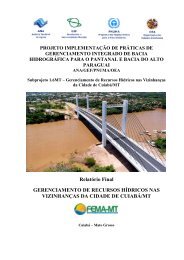Rt€@lll
Rt€@lll
Rt€@lll
Create successful ePaper yourself
Turn your PDF publications into a flip-book with our unique Google optimized e-Paper software.
National research infrastructure<br />
2t7<br />
One problem area within the region needs careful examination because the solution<br />
could in some cases involve considerable investment by the national governments. This is the<br />
creation of a research infrasLnucLure which fulfills the demands of a good Regional Seas<br />
programme. This inf rastructure includes the vessels, equipment and laboratories that will<br />
enable each participating country to obtain the necessary samples at the various places and<br />
times requined by the prognamme, transporting them Lo the laboratories and analysing the<br />
various components to give valid results. This is an entirely different problem from the<br />
institutional problems rnentioned earlier.<br />
In rnost cases, the problem of research inf rastructure eould be mel Lhrough<br />
co-ordination within the country. However, not all of these problems can be so resolved. For<br />
example, although the need for vessels to get samples could be met by taking care of by<br />
taking advantage of the various governrnental and non-governmental sailings within a given<br />
sea, the acquisition and use of specialized equipment could not. No amount of 'rco-qeration"<br />
between various instiLutions can cteate a specialized piece of equipment that is not already<br />
Lhere. The countries in the East Asian region vary greatly in their ability to set up the<br />
proper research infrastructure. For example, the Malaysian Government seems to be quite<br />
generous in its zupport for the acquisition of research materials and equipment, while in<br />
contrast, the Philippine Government has a de facto ban m the importation of research<br />
equipment which makes their acquisition quite difficult.<br />
Therefore, the country representatives m a regional co-ordinating committee or council<br />
must move their respecLive governrnents and institutions to make available the necessary<br />
faciliLies and equipment requined for the Regional Seas co-qerative projects.<br />
Personnel and trainino<br />
In general, there is need to improve the quality of personnel in the vanious institutions<br />
in the negion who will do the day to day work m the co-operative project. Although a<br />
significant amount of environrental work is already being done'in many places, the intensity<br />
and depth of the undertakings fall short of the rigorous requirements of a Regional Seas<br />
programme.<br />
Within each country, institutions competent in training for zuch work already exist. Tfe<br />
problem lies in co-ordinating these for the putposes of the programme so that the quality of<br />
training would be of a uniformly high level. The alternative would be to bning together the<br />
personnel involved at me facility especially active in the field and give them a rigorous<br />
training in the various techniques required. A several month training proqramme, perhaps in<br />
Australia, has been s.rggested by some, although for psychological reasons (among others),<br />
training in me of the developing countries, supported as necessary to upgrade facilities to a<br />
sufficiently high level, would be an alternative that should be explored.<br />
A problem that could well arise in this area of personnel and training is the proper<br />
choice of the people to be sent for training. In many countries in the region, bureaucratic<br />
trfavourites'r tend to be chosen again and again, often to [he detriment of the aims of training<br />
programmes if these favourites happen not to be lhe people who will do the work.<br />
Equipment maintenance and calibration<br />
Equipment and proceedures strould be such that, dat.a obtained from the various parte of<br />
the region are direcLly comparable within the region and with data obtained from the various<br />
other Regional Seas programmes. This requires training progf ammes on the proper<br />
maintenance and calibration of equipment for personnel involved in the co-perative project.<br />
A recent workshop m instrunent maintenance and calibration in the region sponsored<br />
by the Federation of Asian Chemieal Smieties showed that the bulk of maintenance and<br />
calibration of analytical instrunrentation is carried out, not by the analysts who should be<br />
responsible for the quality of their analytical data, but by technicians from the instrurnent<br />
zuppliers. ln some cases this does not pose a real problem, especially if the dealers'rrvice<br />
headquarters happens to be nearby, but in many cases it contributes to unacceptably Iong<br />
down-tirnes fon certain inslrurnents.



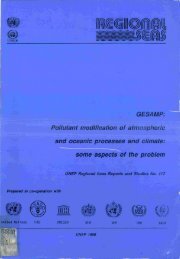
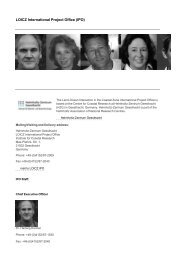
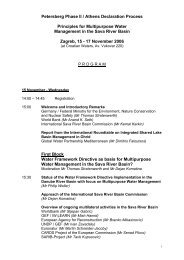
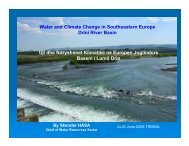
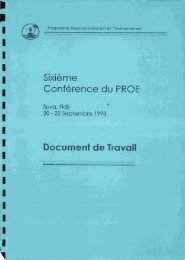


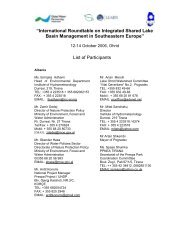

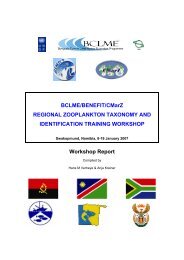
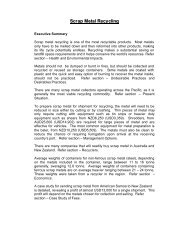
![R]€@lll](https://img.yumpu.com/7594335/1/175x260/reurlll.jpg?quality=85)
